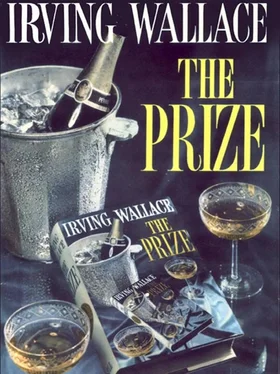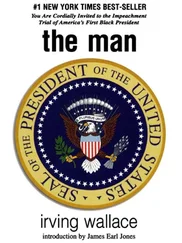For want of anything better to do, Denise Marceau had listened attentively to the last of Count Jacobsson’s telephone conversation. During the last of it, something creative had begun to arouse itself inside her head, something useful, something hopeful. The exact moment that Jacobsson’s receiver had clicked into place, Denise had been struck by an idea. Quite by accident, Craig’s call to Jacobsson had given Denise Marceau what she had sought since yesterday-the guarantee that would keep her husband apart from Gisèle Jordan, at least for the critical present.
Jacobsson had set the telephone to one side of his desk, and now he swivelled his chair towards the Marceaus.
‘I am sorry,’ he said, ‘and I am grateful for your patience. I can sympathize with Mr. Craig. There are days when our programme does seem heavy.’
‘I do not find it so,’ said Denise quickly. ‘I feel that when one is abroad little more than a week, one owes it to oneself and one’s hosts to put every moment to use.’
‘I wish everyone was as-’ Jacobsson began to say.
‘As a matter of fact, Count Jacobsson,’ Denise hurried on, ‘I do not think my husband and I have enough to do here. I am sure Claude agrees with me-’
Taken unawares, Claude was too perplexed with her opinion to make any comment.
‘-and that was why I wanted to request a favour of you this morning,’ continued Denise to Jacobsson. ‘I should have brought it up the first day. Perhaps you will think it presumptuous.’
‘Anything, anything,’ said Jacobsson.
‘I notice by the programme, we have two unoccupied evenings in the next three days. There is the Hammarlund dinner tomorrow, and then the two free evenings. Also, there is one open afternoon. Claude and I would like something scheduled for those times. Nothing frivolous. Rather, appointments that would bring closer ties between us and your scientists in Scandinavia.’
Jacobsson clucked his approval. ‘Most admirable of you, Dr. Marceau. I had turned aside many invitations tendered to you for fear that you might be exhausted.’
‘Not at all,’ said Denise firmly. ‘We are eager to meet as many Swedish chemists and Nobel personnel as possible. You cannot keep us too busy.’
Dimly at first, and now clearly at last, Claude perceived his wife’s strategy. Since he had had no intention of seeing Gisèle in Copenhagen-it had seemed unnecessarily risky when he had considered it in bed last night-there was no reason for Denise to build this cage of activity around him. It was wearisome and foolish. ‘Denise,’ he said quietly, ‘are you not being over-ambitious? I want to participate as much as you do. But I will not have you tax yourself to the limit.’
Denise flashed her husband a hypocritical smile, and returned to Jacobsson. ‘Is he not considerate, Count? He has always been thus. It has made our collaboration possible.’
Jacobsson had tried to understand the nuances of the exchange between the couple, but without further information, he could not have full understanding, and so he gave the lady the benefit of the doubt. ‘I shall contact the Royal Institute of Technology,’ he said, ‘and the Institute of Inorganic and Physical Chemistry at the University of Stockholm. They had been pressing for you to conduct a seminar. However’-he glanced at Claude Marceau’s weary face, and offered him a palliative-‘if you should have a change of heart, find the strain too much, I can always cancel the meetings I intend to arrange.’
‘We will not have a change of heart,’ said Denise firmly. ‘Inform us of our new schedule, and we will both comply.’ She opened her bag for a cigarette. ‘Enough of that. Before the telephone rang, you were speaking of the first chemistry award.’
‘Ah, yes, yes,’ said Jacobsson, relieved to be returned to a subject less controversial. ‘I was trying to brief you on the background of the chemistry award, before showing you the conference room where the Nobel Committee for Chemistry debated your candidacy this past year.’ He tilted back in his chair, his fingertips touching and hands making a pyramid on his chest. ‘As I was saying earlier, Alfred Nobel left one-fifth of the interest on his prize fund to the person or persons “who shall have made the most important chemical discovery or improvement”. That was all the guidance that he gave us. In 1900, the Academy of Science sent letters to ten institutions and to three hundred well-known scientists in every corner of the world, inviting them to make nominations for the first Nobel Prize in chemistry. Out of this, only twenty nominations were made and of these, eleven suggested the name of one man-Jacobus Hendricus van’t Hoff, of the Netherlands, who had founded stereo-chemistry, as you know. He became the first chemistry laureate. Our choice was universally praised.’
Jacobsson was lost in thought a moment. ‘In those early years, we committed only one serious blunder in chemistry. We neglected the American, Professor Willard Gibbs of Yale University.’
‘Gibbs was an absolute genius,’ agreed Claude. ‘I read his monograph, “On the Equilibrium of Heterogeneous Substances”, with complete absorption. However, you can have no shame in overlooking him. I am told that his fellow countrymen did not appreciate him either. One American scientist who visited our laboratory in Paris told me that when Gibbs died-in 1903, I think-his American colleagues and students hardly noticed it. They considered him an eccentric old man. The majority of condolences came from scientists around the world, who had read him and understood his worth.’
Denise addressed Jacobsson. ‘Why did the Royal Academy of Science neglect him?’
‘He was too far ahead of his time, and no one here understood his abstractions,’ Jacobsson said simply. ‘As I told Mr. Craig yesterday, our judges are only too human. They make mistakes. Usually, though, they are right.’
‘Yes, usually they are right,’ said Denise. ‘Have any of your chemistry judges won the Nobel Prize?’
‘Professor The Svedberg was elected in 1926, most deservedly, and he has balloted on many awards. A remarkable man, Svedberg, a one-man faculty, library, student body, all condensed in a single brain. He spoke seven languages, read poetry in Latin, learned Spanish in two months before taking a trip to South America. We have had our share of geniuses. The annual balloting is in good hands.’
‘How do your judges determine if a certain candidate should be honoured in chemistry or physics?’ inquired Claude. ‘To my mind, there is often considerable overlapping.’
‘You have touched upon one of our major problems,’ agreed Jacobsson. ‘When such a decision has to be made, the chemistry and physics committees of the Academy of Science exchange their views and make an arbitrary judgment. I would guess that such a decision might have been made in 1944, when Dr. Otto Hahn was a candidate for discovering nuclear fission, which affected physicists everywhere and led to the atom bomb. But Hahn’s experiments were actually in chemistry, and so he received the chemistry award. I suspect that our chemistry judges are happiest when there is no overlapping, and they can vote for candidates whose findings are unquestionably in the chemical realm. Many such clear-cut decisions come to mind at once-Sir William Ramsay’s discovery of helium, Henri Moissan’s isolation of fluorine and adoption of the electric furnace and his production of artificial diamonds. Actually, in the case of Moissan, a majority of the Academy had favoured the Russian, Dmitri Mendeleev, for inventing the periodic system-but one minority judge impressed the others with Moissan’s versatility, and those artificial diamonds carried the day. Other clear-cut decisions? Richard Willstätter’s work, and later Hans Fischer’s, on chlorophyll, and, in 1960, Willard F. Libby’s atom time clock, which could tell the age of fossils fifty thousand years old, dating even the hair of an Egyptian mummy. Those are the chemistry awards our judges like the most.’
Читать дальше












